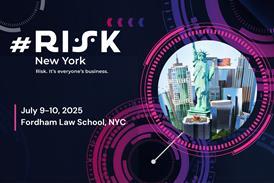We are very happy to reveal that Cyber Awareness Lead, Michelle Levesley will be speaking at PrivSec London, next week.

Live at Park Plaza, Riverbank in London on February 28 and March 1, PrivSec London gives global audiences the chance to learn more about Trust, Digital Transformation, Ethics, Data Protection, Privacy, Security and much more.
The event will also provide a unique opportunity for industry professionals to network with peers and develop business relationships.
Cyber Awareness Lead at Channel 4, Michelle Levesley began her career as a teacher. After 20 years working in schools and working with technology, she transitioned into cybersecurity. Today, Michelle campaigns against online harm and for victims of intimate partner abuse, and for digital citizenship. She also specialises in Incident Response and Communications, and runs workshops on moving security awareness beyond the phish.
Michelle will appear exclusively at PrivSec London to discuss the role played by cybersecurity in disaster response and business continuity planning.
We caught up with Michelle for more on her professional journey to date, and for an introduction to the themes on the table at her PrivSec London session.
Can you describe your career pathway so far?
I’ve had a non-traditional portfolio career in cybersecurity, which is why I’m passionate about more balanced hiring. Originally, I was a language teacher and did a lot of tech stuff on the side. I was a trailing spouse when I got married so I moved around the world, I started advising companies on marketing, website design, and online payments.
I began working in cybersecurity about eight years ago and did a lot of free work to build my portfolio and prove myself. I still do volunteer work and also work with schools on digital citizenship.
Why is cybersecurity crucial for disaster recovery and business continuity planning?
Cybersecurity is incredibly important for disaster recovery and business continuity planning because without proper cybersecurity controls and infrastructure, businesses are less likely to be prepared for any incident, whether physical or cyber-related, such as a ransomware attack.
It’s crucial for businesses to build in these controls and have resilience and backup plans in place, such as using cloud-based storage and digital identity solutions, which make it easier to get back up and running after an incident.
However, it’s not always easy, and businesses need to think beyond just data backups and also consider how to restore other aspects of their estate if things go wrong. As cybersecurity practitioners, our job is to present risks to the business so that they can consider potential threats and take appropriate measures to protect themselves.
Ultimately, good cybersecurity practices can help businesses to be more resilient and prepared for any potential disasters.
What are the challenges that businesses face in improving their cybersecurity and building resilience, particularly post-pandemic?
There are several challenges that businesses face in improving their cybersecurity and building resilience, especially post-pandemic.
The biggest challenge is time, as many teams are overworked and running lean. Layoffs have been quite common, particularly in trust and safety and security teams, which is a major concern. The most significant asset that businesses have is their people, especially their security teams, who are defending against cyber threats. However, they are increasingly overworked and stressed, which can lead to missing something important, being unable to respond or recover effectively, and experiencing burnout.
Addressing the people issue and ensuring that they have the capacity to address cybersecurity threats is essential for building resilience. This is the foundation upon which any technology structures are built. Good security, privacy, and multi-factor authentication are low-cost or even free solutions that should be built into any cybersecurity strategy. High-cost solutions are necessary only for large global organizations that require millions of licenses.
Returning to the office could make businesses less secure because commuting and exhaustion can make people more vulnerable to cyber threats. For those whose jobs involve securing and defending against cyber threats, being in the office all the time is not necessary, and it could exhaust them unnecessarily. As someone who comes from a human-centric background, I believe that listening and understanding the human side of things is crucial to building a strong cybersecurity posture.
Don’t miss Michelle Levesley exploring these issues in depth at PrivSec London in her session: “The Role of Cybersecurity in Disaster Recovery and Business Continuity Planning”.
The session sits within a two-day agenda of insight and guidance at PrivSec London, taking place at Park Plaza, Riverfront in London on February 28 and March 1.
The event brings together thought leaders and senior industry professionals to help you understand more about Trust, Digital Transformation, Ethics, Data Protection, Privacy and Security challenges.
Content is delivered through keynotes, presentations and panel discussions.
→ Location: Security Theatre
→ Session: “The Role of Cybersecurity in Disaster Recovery and Business Continuity Planning”
→ Time: 09:30am – 10:10am GMT
→ Date: Wednesday 1 March 2023
PrivSec London is also available on-demand for global viewing.
Click here to book your place at PrivSec London


































No comments yet